|
|
|
Sort Order |
|
|
|
Items / Page
|
|
|
|
|
|
|
| Srl | Item |
| 1 |
ID:
116110
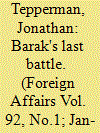

|
|
|
|
|
| Publication |
2013.
|
| Summary/Abstract |
Ehud Barak is one of Israel's most important leaders -- and also one of its most enigmatic and controversial. As defense minister in the current government, Barak prosecuted the November Gaza campaign, handles the Palestinian brief, and, along with Prime Minister Benjamin Netanyahu, gets the last word on whether to attack Iran -- Israel's most pressing security concern despite the recent focus on Hamas. Given the pariah status of Israel's foreign minister, Avigdor Lieberman, Barak, a frequent presence in Washington, essentially covers that portfolio as well. Yet despite 35 years of military service and more than a decade in public life, Barak remains something of a cipher -- a man one of Israel's leading columnists, Ari Shavit, compares to a stealth bomber ("the usual radar doesn't capture him"). "I don't know anyone more difficult to read," Shavit says.
|
|
|
|
|
|
|
|
|
|
|
|
|
|
|
|
| 2 |
ID:
103229
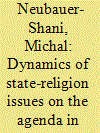

|
|
|
|
|
| Publication |
2011.
|
| Summary/Abstract |
The continuous threat to the existence of the state of Israel is reflected in a rigid agenda, causing extremely stiff competition for attention. Nevertheless, the question of the relationship between state and religion manages to be placed high on the agenda. By focusing on the case study of euthanasia during the 14th Knesset headed by Benjamin Netanyahu and the 15th Knesset headed by Ehud Barak, this article proposes an explanation that is applicable to Israel's socio-political context regarding the positioning of issues concerning state and religion on the policy-makers' agenda.
|
|
|
|
|
|
|
|
|
|
|
|
|
|
|
|
| 3 |
ID:
128904
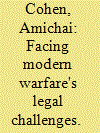

|
|
|
| 4 |
ID:
109001
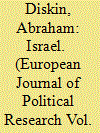

|
|
|
| 5 |
ID:
118379
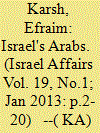

|
|
|
|
|
| Publication |
2013.
|
| Summary/Abstract |
The violence wrought by Israel's Arabs on their Jewish compatriots in October 2000 was not an act of social protest as wrongly claimed by the Orr commission, but rather an internal uprising in support of an external attack. Just as the leader of the Palestinian Arabs during the mandate era, Hajj Amin Husseini, dragged his reluctant constituents into a disastrous conflict that culminated in their collective undoing, and Yasser Arafat used the Oslo accords to implicate his equally grudging subjects in the worst military confrontation with Israel since the 1948 war, rather than create the independent Palestinian state envisaged by the accords, so Israel's Arab leaders radicalized their community for decades. The more prosperous, affluent, and better educated the Israeli Arabs have become, the greater has grown their leadership's incitement against their state of citizenship, to the point where many ordinary Arabs have come to openly challenge the fundamental principles underpinning its very existence.
|
|
|
|
|
|
|
|
|
|
|
|
|
|
|
|
| 6 |
ID:
192895


|
|
|
|
|
| Summary/Abstract |
Thirty years after its euphoric launch, the ‘Oslo peace process’ between Israel and the PLO stands as the worst calamity to have afflicted Israelis and Palestinians since the 1948 war, and the most catastrophic strategic blunder in Israel’s history. By replacing Israel’s control of the West Bank and Gaza Palestinians with corrupt and repressive terrorist entities that indoctrinated their subjects with burning hatred of Jews and Israelis, as well as murdered some 2,000 Israelis and rained thousands of rockets and missiles on their population centres, the Oslo process has made the prospects for peace and reconciliation ever more remote. By deflating the combative ethos of the Israel Defence Forces (IDF), it has weakened Israel’s national security and made the outbreak of a multi-front war a distinct possibility. By transforming the PLO (and, to a lesser extent, Hamas) into internationally accepted political actors without forcing them to shed their genocidal commitment to the Jewish state’s destruction, it weakened Israel’s international standing. And by deepening Israel’s internal cleavages and destabilising its sociopolitical system, it has created a clear and present danger to the Jewish State’s thriving democracy, indeed to its very existence.
|
|
|
|
|
|
|
|
|
|
|
|
|
|
|
|
| 7 |
ID:
106386
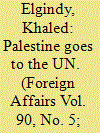

|
|
|
|
|
| Publication |
2011.
|
| Summary/Abstract |
The Palestinian plan to ask the UN for statehood in September has provoked intense anxiety in Jerusalem and Washington. But the move is less provocative than commonly thought. Palestinian leaders are not aiming at short-circuiting the peace process; they are trying to level the playing field in order to promote future negotiations with Israel and the United States.
|
|
|
|
|
|
|
|
|
|
|
|
|
|
|
|
| 8 |
ID:
169987
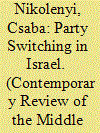

|
|
|
|
|
| Summary/Abstract |
In January 2011, former Israeli Prime Minister Ehud Barak issued a surprising announcement to take four other members of his Labor Party’s Knesset faction with himself to set up a new political party, Haatzmaut (Independence). The conditions under which this split took place illustrate the ways in which the Israeli anti-defection law, passed in the 12th Knesset, incentivizes the behavior of elected legislators who seek to exit from the party that they were elected to represent. This article shows that the anti-defection law cannot keep a legislative party together that suffers from weak internal cohesion. In fact, by imposing numerical criterion (1/3) on prospective party switchers, the anti-defection law prolongs internal disunity, thereby further weakening an already low level of cohesion.
|
|
|
|
|
|
|
|
|
|
|
|
|
|
|
|
| 9 |
ID:
116647


|
|
|
|
|
| Publication |
2012.
|
| Summary/Abstract |
In recent months Israel's political and defence leaders have engaged in an unprecedented and vociferous public debate about Iran's nuclear programme, and about the advisability of an Israeli strike to destroy or delay it. Meir Dagan, the former head of the secret intelligence service Mossad, called an Israeli attack, at this time, 'the stupidest thing I have ever heard of', warned that it might ignite a regional war and stated that there was still a window of some three years, while the former head of the internal security agency Shin Bet, Yuval Diskin, stated that he did 'not trust' Prime Minister Benjamin Netanyahu's and Defense Minister Ehud Barak's 'messianic' leadership. The former chief of staff (2007-11) of the Israel Defense Forces (IDF), Gabi Ashkenazi, has been more restrained, but has made clear his opposition to an operation at this time, and even the current chief of staff, bound by the strictures of his office, has let it be known that he is not enthusiastic.
|
|
|
|
|
|
|
|
|
|
|
|
|
|
|
|
|
|
|
|
|